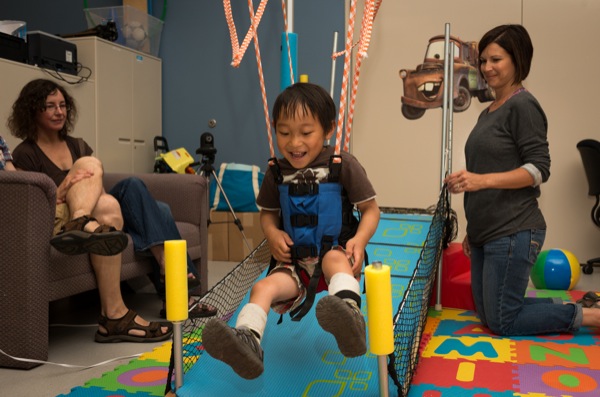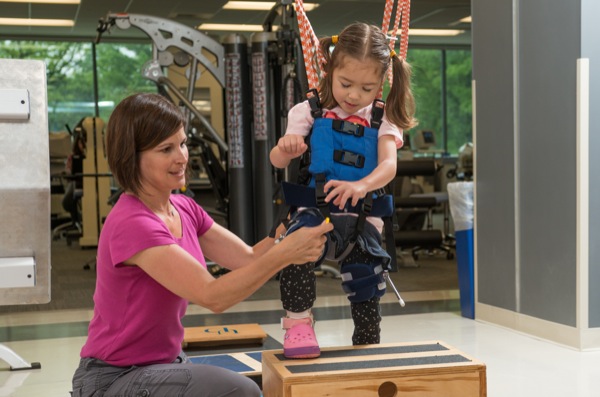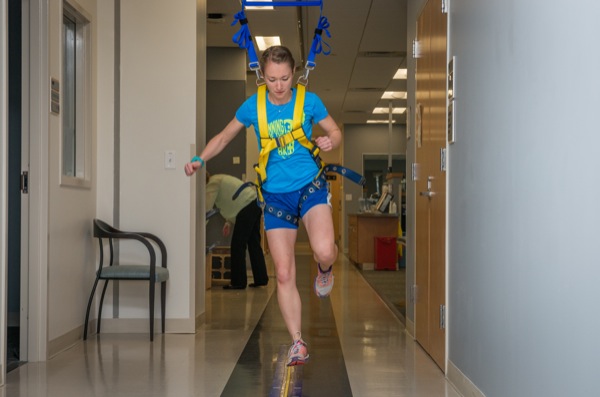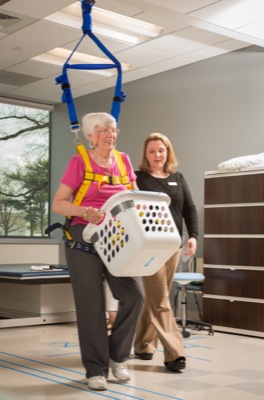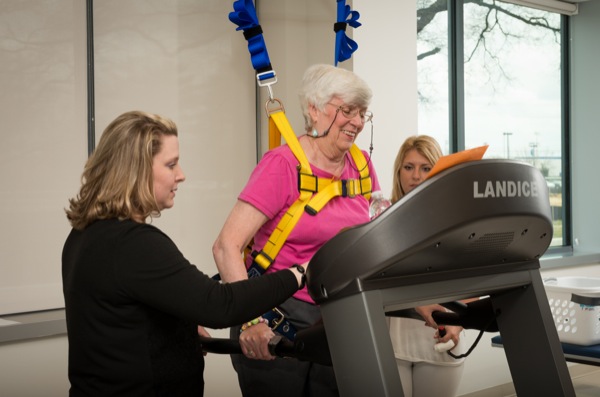

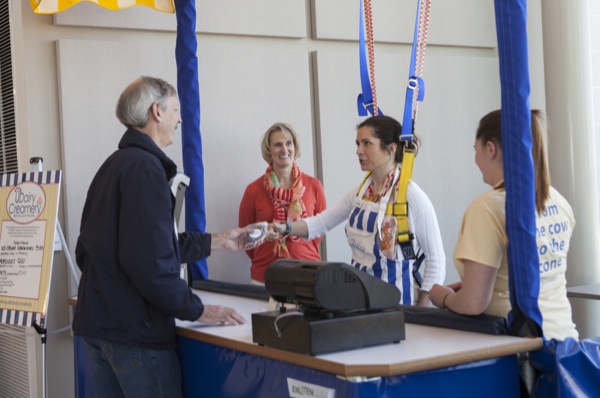
Harnessing human potential
Body-weight-support technology supports rehabilitation, research, education
9:03 a.m., June 26, 2014--Four-year-old Maya loves playing Barnyard Bingo, but the game is work disguised as play for the little girl.
Maya, who has cerebral palsy, can’t walk on her own, but a unique harness system enables her to not only run and reach but also cross a miniature bridge and trudge through “mud” as she plays Barnyard Bingo and other games with University of Delaware physical therapist Tracy Stoner.
Campus Stories
From graduates, faculty
Doctoral hooding
The Health Sciences Complex at UD’s Science, Technology and Advanced Research (STAR) Campus is home to a number of these devices, which are seeing increased used in research, rehabilitation, and education.
More formally known as “fall-arrest and body-weight-support systems,” the structures include track systems in the Delaware Physical Therapy Clinic, open-area support systems such as the GoBabyGo Café, and portable units like the one in the GoBabyGo Lab and Design Studio at STAR, as well as a large body-weight-support system in the gym at UD’s Early Learning Center.
All were custom designed and installed by Enliten LLC, a local small business started by UD alumnus Ralph Cope and his brother Steve.
“The harness systems enable us to challenge our patients while also keeping them safe,” says Darcy Reisman, associate professor of physical therapy. “Also, from a teaching perspective, harnesses give clinical instructors another layer of confidence and allow students to safely explore treatment options.”
Reisman points out that many rehabilitation devices are designed for specific populations, but the Enliten harness systems serve everyone from toddlers and injured athletes to stroke survivors and people with traumatic brain injuries.
For Anne Dunlap, who was injured in a car accident at the age of 18, the harness in the GoBabyGo Café provides an opportunity to gain valuable occupational and communication skills. Through a collaboration with the UDairy Creamery, which produces ice cream made with milk from the cows on the farm at the UD College of Agriculture and Natural Resources, Dunlap will soon begin selling ice cream at the GoBabyGo Café.
The carefully engineered system in the café enables Dunlap to move anywhere within the 50-square-foot structure. After her first test work session, she said to Cope, “Hey, Steve, can I have one of these in my house?”
For Cope, no request is out of bounds. “I’m finding new applications like the café very exciting and opening up new ways of thinking about therapy and social interaction in clinical, work, and home environments,” he says.
Reisman says that working with Enliten has been a true partnership.
“We started with a problem, and they helped us develop a solution,” she says. “They didn’t just try to sell us a device and expect us to find a use for it. A number of national companies offer stock products, but we couldn’t find anyone else that offered the custom support we have with Enliten.”
In one case, the harness actually helped clinicians save a life, when a research participant using a treadmill experienced a heart attack.
“The support system worked exactly as intended by preventing the patient from falling and incurring additional injuries until a team was able to reach him and administer CPR,” says Cope.
For patients in the PT Clinic, the technology is a game changer. “One woman said to Reisman, “‘If only I could unhook this and attach it to a cloud.’”
And for four-year-old Maya, the harness is a game with a purpose.
“She’s learning skills that will help her in her daily life as she gets older,” says Stoner. “Her physical control has improved significantly with this approach — and she has a lot of fun doing it.”
About the technology
Enliten LLC is a spinoff of Accudyne Systems, which was established in 1996 to create custom automation equipment to solve manufacturing challenges across a variety of industries.
Enliten provided the following information about their portable mobility aids (e.g., the canopy unit in the GoBabyGo Lab), open area support systems (e.g., the GoBabyGo Café), and custom installations (e.g., the track system in UD’s Physical Therapy Clinic):
- The user is connected to the support structure with a strap that provides no lift when the user is moving but catches the person if he or she starts to fall.
- A counterbalance or elastic connection between the user and the support structure provides a steady vertical force to reduce the load on the user’s legs.
- Low-friction, lightweight “cars” provide support wherever the user roams with no need for electrical connections.
- A turntable enables the user to change direction with a twist of the wrist.
- With all support coming from overhead via soft links, users are free to interact with their surroundings with no interference. They can swing a bat, kick a ball, play Barnyard Bingo … or serve ice cream.
Editor’s Note: Stay tuned for more news about the official launch of the GoBabyGo Café at STAR later this year.
Article by Diane Kukich
Photos by Kathy F. Atkinson and Ambre Alexander Payne




